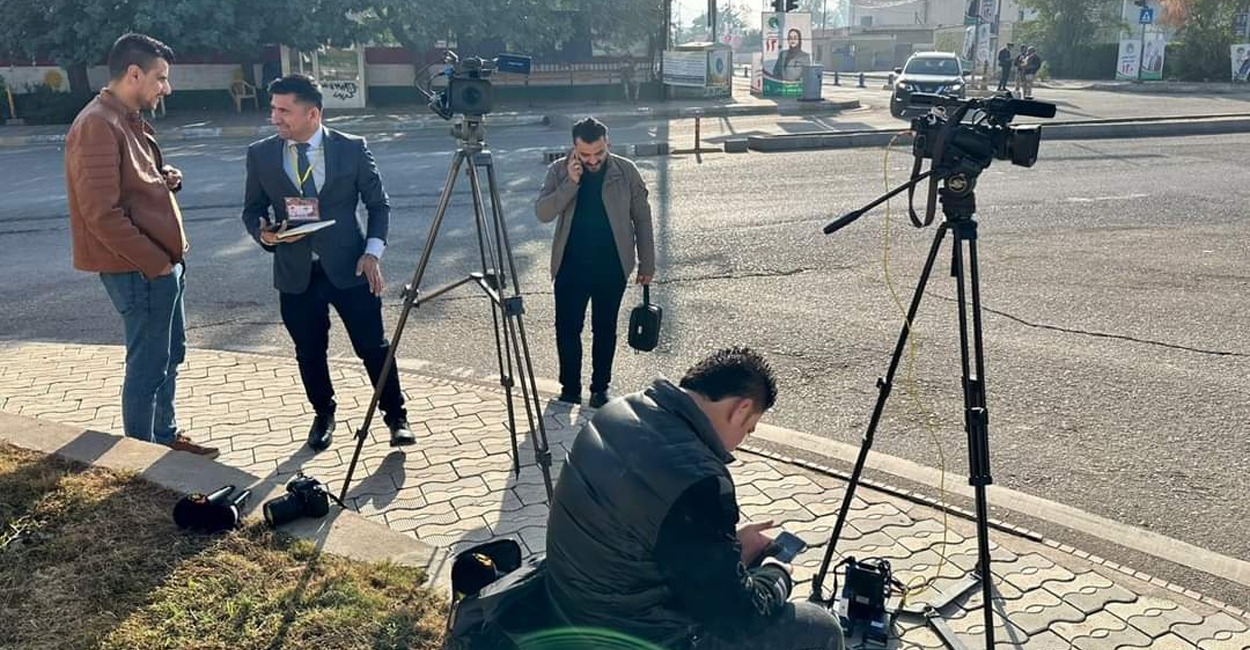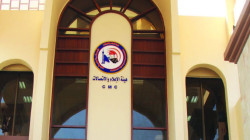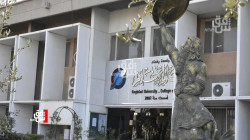The media maze in Iraq: challenges and ambitions of media graduates

Shafaq News/ Many media college graduates in Iraq are venturing into alternative fields or pursuing independent projects.
As of October 8, 2023, data from the Media and Communications Authority reveals a robust media ecosystem in Iraq, encompassing over 300 active radio, television, and media offices.
Among these are 57 licensed Iraqi television channels, supported by 152 radio stations and over 60 external offices serving channels targeting the Iraqi audience. This landscape is diverse, with ownership ranging from political entities to private businessmen.
Despite the apparent diversity, transparency remains a challenge, as many Iraqi media outlets obscure their funding sources while positioning themselves as profit-driven entities. Observers note a significant influence of political funding behind the scenes, shaping the narratives and operations of these media organizations. Employment within these channels varies, with staff numbers ranging from 50 to 200 employees per station, with average monthly salaries averaging around $800 per individual. Notably, most stations maintain a digital presence through websites and radio platforms.
Hassan Ibrahim, a fourth-year student at the College of Media at the University of Baghdad, feels "anxiety and fear about his future." His dream of working in journalism has encountered hurdles due to the limited opportunities and financial challenges facing media institutions in Iraq.
The fourth-year students at the College at the University of Baghdad will celebrate their graduation ceremony at the end of the academic year. However, they join previous graduates seeking answers about job opportunities that start before graduation and extend afterward.
Influencers and Institutional Dysfunction
Graduates of media colleges blame those who label them as "intruders" in the media and journalism industry for their job struggles, arguing that these labeled individuals lack the required professional qualifications.
Sarah Maad, a student from the University of Baghdad's College of Media, told Shafaq News Agency, "Most media channels prioritize appearance over experience or skills. We, as students, have good media potential but lack presence in the job market."
She adds, "Restrictions prevent many students from entering local media, as the current dominance of 'influencers' and individuals with large social media followings shapes the media scene. This trend impacts students' aspirations and diminishes their chances for employment, particularly because we lack a dedicated ministry where job placements could be centralized."
In this regard, Dr. Jameel Naif, a lecturer at the College of Media at the University of Baghdad, explained to Shafaq News Agency, "The dysfunction within media institutions stems from their tendency to attract individuals and showcase them to the public, even when many lack formal qualifications or proficient language skills, leading to non-journalistic vocabulary use."
He also pointed out the importance of practical training for students, stating, "We aim to prepare graduates practically, not just theoretically."
Opportunities Exist, But...
Contrary to the situation described above, student Ayoub Qassim pointed out that opportunities do exist but require university students to engage in the media field actively.
"Opportunities exist but require university students' initiative to enter the media field…most media workers are not journalism graduates, and it's not a matter of qualification but rather competition and proving competence in these fields."
He adds, "Given the current trends, there is a pressing need for specialized media training. However, a fundamental issue lies in the lack of trust between media institutions and media graduates; they often overlook graduates' capabilities and opt for ready-made personalities. Therefore, I am committed to practical growth and professional advancement, and I will assert myself whenever these institutions require it."
His colleague, Hani Al-Atti, told Shafaq News Agency, "Media outlets often overlook the significant number of graduates from media colleges. However, some graduates make their mark in media by actively developing their skills and capabilities."
Al-Atti adds that " The individuals currently seen on screen have largely gained visibility through social media platforms, and while some channels leverage them for audience engagement and ratings, they often lack genuine professionalism. However, they are not responsible for the absence of media students from employment opportunities. I believe their prominence is temporary and transitional."
Successful "Experiment" and Media "Shops"
Writer and journalist Majid Kaytan explained that It's unfortunate that 80% of graduates are unqualified for media work due to various reasons, primarily deficiencies in the curriculum and inadequate practical training. Moreover, there is a lack of efforts to integrate graduates into the workforce, with appointments often influenced by connections and favoritism, resulting in sporadic opportunities. This oversaturation in certain institutions has negatively impacted media students."
Regarding the existence of academies or media centers offering courses for students, journalist Kaytan explained that "these academies can be described as 'shops.' They cannot make a qualitative leap because their courses and tools are simple, aimed at profit, and I don't believe they are effective."
Plan of College of Media at Baghdad University
Dean Dr. Amar Taher said, "The college receives about 250-300 students for all departments annually," noting that "media studies require teaching students skills, techniques, and practical participation. When there is a large number, students lose this opportunity."
He adds, "We have an ambitious plan to produce graduates who align with the job market demands. We aim to ensure that undergraduate students are well-prepared upon graduation, even achieving a qualification rate of 50-60% in the job market, setting them apart from graduates of other colleges. We are working towards this significant goal by integrating practical training with classroom learning, enhancing our infrastructure, and leveraging modern technologies in our academic approach."
Comparing the Iraqi media landscape with that of the Arab region, journalist Sarmad Al-Abbadi emphasized to Shafaq News that Iraqi media outlets prioritize quantity over quality.
He pointed out that a significant number of satellite channels in Iraq have not contributed significantly, if at all, to enhancing the viewing experience for Iraqi audiences.
Al-Abbadi attributed this to divergent orientations and varying perceptions of reality shaped by the agendas of their funders and supporting entities.
He continued, "Hence, there's often an influx of media graduates confronting media outlets that fail to meet expectations. Ironically, some Arab channels have attracted Iraqi media professionals who have excelled significantly compared to their prior experiences in Iraq."





